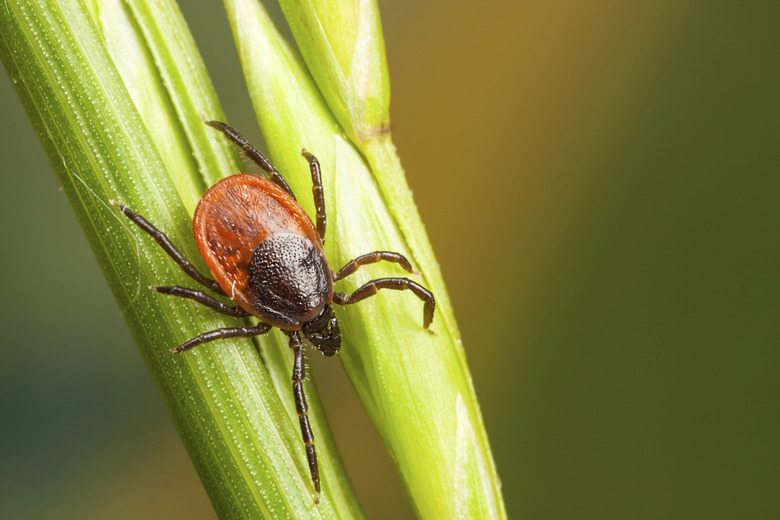What Purpose Do Ticks Serve In The Ecosystem?
If disease-carrying, blood-sucking parasites aren't really your thing, you would probably support a plan to eradicate ticks from the planet. These tiny pests aren't without purpose, however. They benefit the moist, dark ecosystems in which they live by serving as a food source for many reptiles, birds and amphibians. They also help control wild animal populations. Scientists even use them as an indicator of an ecosystem's overall health and stability. Found throughout forests and grasslands in North America and Europe, these annoying little critters do serve a purpose.
Food Source
Food Source
When ticks are feeding on you or your pets, it's easy to forget that other species are feeding on the ticks. Ticks are an important source of food for several species of reptiles, amphibians and birds. Many woodland animals feed on them as well, including wild turkeys and western fence lizards. Knowing that ticks are a source of food may help you appreciate their existence, but it also gives you a clue how to combat them. Some people living in areas with heavy tick infestations raise guinea fowl, which eat the ticks and reduce their population. This practice is particularly common in areas that house livestock and helps protect farm animals from tick-borne disease.
Disease Vector
Disease Vector
Humans who think about diseases are often trying to prevent or cure them. Like ticks, however, disease serves an important purpose. Disease helps to control wildlife populations while weeding out the weaker animals, preventing them from passing on potentially flawed traits. Nature is all about survival of the fittest, and disease helps determine which animals are, in fact, the fittest. Ticks carry Lyme disease, Rocky Mountain spotted fever and tularemia, all of which have a big influence on the health of animal populations within an ecosystem. Without these diseases and the ticks that spread them, an area could find itself overrun with deer, rabbits, mice and other animals who otherwise would have become ill and died.
Ecosystem Indicator
Ecosystem Indicator
Ecologists monitor tick populations to gain a better understanding of the health of particular ecosystems. An increase in tick populations may indicate a decrease in the predators of small mammals. A study of timber rattlesnake populations in the eastern United States, for example, found that healthy snakes will eliminate thousands of ticks every year by eating mice and other small mammals on which ticks feed. Ecosystems with thriving snake populations have smaller populations of ticks, so an increase in ticks may indicate a problem within the snake population. Scientists use this information to help prevent animal extinctions and monitor potential environmental problems.
Avoiding Ticks
Avoiding Ticks
Completely eliminating ticks probably isn't possible and is a potentially bad idea, even if it were feasible. It's still important to protect yourself from them, however, so you don't contract one of the many diseases they carry. The longer a tick remains attached to its host, the greater the chance that it will transfer disease-causing bacteria to that host. Check yourself and your pets after hikes and outdoor romps, promptly removing any ticks you find, To do so, pull the tick out of the skin gently with a pair of tweezers. Use a slow and steady motion. Do not twist or tug, as this may cause its mouthparts to remain embedded in the host. Clean the area of the tick bite thoroughly after removal. Avoid tick bites by wearing long pants, socks and sturdy shoes in areas known to harbor ticks. Insect repellents that contain DEET are also effective for warding off these parasites. Protect your pets with an appropriate flea and tick preventive.
Cite This Article
MLA
Cairoli, Sarah. "What Purpose Do Ticks Serve In The Ecosystem?" sciencing.com, https://www.sciencing.com/what-purpose-do-ticks-serve-in-the-ecosystem-12192945/. 5 March 2018.
APA
Cairoli, Sarah. (2018, March 5). What Purpose Do Ticks Serve In The Ecosystem?. sciencing.com. Retrieved from https://www.sciencing.com/what-purpose-do-ticks-serve-in-the-ecosystem-12192945/
Chicago
Cairoli, Sarah. What Purpose Do Ticks Serve In The Ecosystem? last modified August 30, 2022. https://www.sciencing.com/what-purpose-do-ticks-serve-in-the-ecosystem-12192945/
